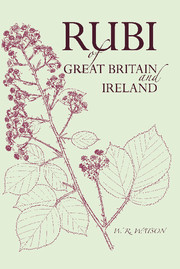Book contents
- Frontmatter
- Foreword
- Preface
- Contents
- INTRODUCTION
- I Environmental variations
- II Genetic intraspecific variations
- III Chromosomes and genes
- IV Reproduction
- V The species in Rubus
- VI Ecesis and migration
- VII Enemies, pests and diseases
- VIII Classification
- IX Collection and identification
- X Characteristics of the British-Irish bramble flora
- XI Cultivating native blackberries for fruit
- XII Note on the nomenclatural type species for the genus Rubus and subgenus Rubus
- XIII Key to the vice-county numbers
- XIV Signs and abbreviations
- ARRANGEMENT OF THE GENUS RUBUS LINN. IN AN ANALYTICAL KEY
- DESCRIPTIONS
- DRAWINGS
- Glossary
- Principal works consulted
- Index
XI - Cultivating native blackberries for fruit
Published online by Cambridge University Press: 05 June 2016
- Frontmatter
- Foreword
- Preface
- Contents
- INTRODUCTION
- I Environmental variations
- II Genetic intraspecific variations
- III Chromosomes and genes
- IV Reproduction
- V The species in Rubus
- VI Ecesis and migration
- VII Enemies, pests and diseases
- VIII Classification
- IX Collection and identification
- X Characteristics of the British-Irish bramble flora
- XI Cultivating native blackberries for fruit
- XII Note on the nomenclatural type species for the genus Rubus and subgenus Rubus
- XIII Key to the vice-county numbers
- XIV Signs and abbreviations
- ARRANGEMENT OF THE GENUS RUBUS LINN. IN AN ANALYTICAL KEY
- DESCRIPTIONS
- DRAWINGS
- Glossary
- Principal works consulted
- Index
Summary
I would address one general admonition to all; that they consider what are the true ends of knowledge, and that they seek it not for pleasure of the mind, or for contention or for superiority to others, or for profit, or fame, or power, or any of these inferior things: but for the benefit and use of life.
bacon, Preface to The Great InstaurationA s would be expected, the fruits of different species of Rubus differ much from one another in edible quality: the best of them, allowed to ripen completely under the protection of a net or muslin, are well worth cultivation in the garden for home consumption. They do not travel well.
Mrs Lankester in Syme's English Botany praises the fruit of the dewberry as ‘very superior, and larger than any other blackberry’, an estimate which one cannot endorse, either as to flavour or size. She is possibly thinking of R. Balfourianus, of which one does sometimes meet with a strain producing large fruit of a mulberry flavour, and which Bagnall described as much more delicious even than R. gratus. It is perhaps the ‘Rubus morus, the Mulberry Bramble, so called by the Country People at Sutton, in Essex’. (Dillenius, Indiculus, appended to Ray's Synopsis (3rd ed.), extracted from Merret's Pinax (1666), p. 106.)
Babington, who cultivated blackberries in the Cambridge Botanic Garden, placed R. hastiformis amongst the best flavoured known to him. I have not grown it, but it was chosen at Merton for crossing with R. inermis Willd. and a useful fruit has been selected which is being extensively grown.
It is, however, within the power of anyone, without needing to know the name of any bramble, to choose a large fruit that pleases him from a bush on which the fruits are consistently large, sow the seeds at once, and in three years’ time begin to enjoy crops of the fruit, probably somewhat improved by cultivation, from his own garden. Not the smallest merit of the blackberry is that it improves the apple pie, pudding or stew, and is itself improved by the association.
- Type
- Chapter
- Information
- Handbook of the Rubi of Great Britain and Ireland , pp. 22 - 24Publisher: Cambridge University PressPrint publication year: 2013



